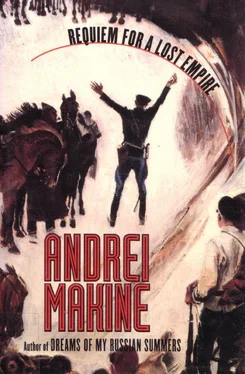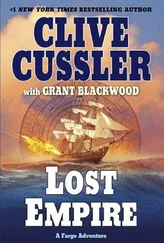As he talked, Marelst raised his head from time to time and the lenses of his glasses caught the light of the fire, making his eyes disappear, as if beneath a spurt of blood. Pavel told himself that in peacetime they would never have met and even if they had met would never have understood one another. "A man from Leningrad," Pavel would have thought with suspicion, "the son of a minister." It occurred to him now that the war had simplified everything. There was this fire, drying the slabs of mud on their boots and causing it to flake, the darkness over this plain, lost somewhere between Poland and Germany, this scrap of land in the night, just snatched back from the enemy. And this man, sitting close to the fire, a man talking very quietly, as if in his sleep, who was quite complete in what he was saying. Pavel suddenly understood that there was nothing else: darkness, a man, a voice. Everything else was a peacetime invention. Man was simply this naked voice beneath the sky.
The next day, as they set out on the road again, he thought that after the battle he would tell Marelst what he had always kept to himself: the story of that woman buried alive, with her child in her belly, a woman with no voice but whom he could always understand.
In the next battle they were due to liberate a concentration camp. Transformed into a fortified base, it was holding up the offensive of an entire division. It was not known if there were any prisoners left in the huts: all that could be seen was some thirty captives tied to posts around the camp as a shield. They would have to attack without firing a single shell, without hand grenades. "With our bare hands?" exclaimed a newcomer in amazement. No one answered him. Three penal companies were thrown into the assault, six hundred men. After the first attack, which was driven back, Pavel saw that the rolls of barbed wire had half disappeared under inert bodies. Further off, all along the fence, the bound prisoners watched in silence the ebb and flow of soldiers letting themselves be killed without being able to respond.
At the fifth or sixth wave, when only a quarter of the three companies remained, Pavel, by now deaf and with the taste of burned blood in his throat, withdrew in a group of a dozen soldiers toward a broad ditch to the rear of the camp. Someone leaned down to take a drink but straightened up again immediately: his hands had drawn up a viscous, yellowish pulp. It was a narrow dead river, blocked with ashes. They shuffled for several seconds, without mustering the resolve to pass through this stagnant liquid, where several corpses floated. Marelst came up at this moment and Pavel saw his figure moving forward, wading in up to his knees, up to his belt, up to his chest. His arms held his submachine gun high above his head. When he reappeared on the far bank, coated with a thick crust of scum, the soldiers raced after him and time went into turmoil, as if to make up for the delay. On one watchtower the barrel of a machine gun aimed at them frenetically. The scum came to life, seethed with bullets. The machine gunner twisted about at the top of the watch-tower, struggling against the dead angle. An attack from that direction had doubtless not been foreseen. The soldiers rushed toward the barbed wire. And, as always in combat, everything disintegrated into a series of increasingly rapid and random flashes. A beam of the watchtower blows up. The machine gunner with his brow torn open by a burst of fire. He falls and reappears, his face is intact-it's another German. The bullets lash the scum, rake the bank. One soldier stops, sits down, as if to take a rest. Pavel swerves around him as he runs, hurls an oath at him, then realizes… In the distance a mass of gray-green uniforms pours out between the huts-the German reinforcements. To the left, tied to a post, one of the prisoners seems to be smiling; no doubt he's already dead. The first line of barbed wire. The soldier running in front of Pavel leaps and suddenly straightens up, fingers his throat. The lower part of his face has been blown away by a fragment from a hand grenade. His body falls, a bridge across the jagged wire. They climb over his back. Someone else falls. The bridge grows longer. The sky is turned upside down by an explosion. The earth shakes his body and hurls it into the blue. What he sees: an encounter between a clod of earth and a cloud. The sky is beneath his body, which is drowning in the blue. A torn-off arm, as if someone had abandoned it behind a roll of barbed wire. A German's eyes, his mouth open, and the smoothness, almost tenderness, with which the bayonet plunges into his belly. Another explosion. The skewered body protects him from the shrapnel. The gaping door of a barrack hut. The pile of skeletons in striped garments. A German lying in wait behind this heap. A grenade scattering the dead. A section of the wall crumbles-the violence of the sunlight. The German writhes amid the striped bodies. A hut burns. A half-naked being crawls to safety out of the flames. The deafness is total. Explosions are heard by the stomach, the lungs, and pressure on the temples. Silence also comes from inside, from the belly. The eyes, still feverish, ricochet from one wall to another, from a shadow to a door that suddenly bangs, blown by a blast of wind. Then the body no longer hears anything. Gradually the ears start hearing again in their turn. Silence. The chirping of a cricket in the grass between two lines of barbed wire. And, crumpled up against the wall of a hut, a soldier with a broad trail of blood across his chest. And his cry ("water") which for the others is no more than the proof that their hearing has returned and their own lives are intact.
The soldiers walked back and forth across the camp, like runners after a race, strolling about to let the fever of the effort die down. They checked all the huts, they freed the bound prisoners (most of whom collapsed beside their stakes). The commanding officer counted. About forty of the wraiths clad in striped garments showed signs of life, some of them by opening their eyes, some by attempting to get up. Out of the six hundred members of the three penal companies twenty-seven soldiers remained.
Pavel found it difficult to disengage Marelst's body. He had to lift the other bodies, draw out the barbed wire. Most notably, the soldier's fingers seemed to be clinging to the earth. In his comrade's knapsack Pavel found two letters sent from Leningrad before the siege. He kept them.
Despite the fighting that started again the next day and the infinite diversity of the mutilated bodies, he could not forget Marelst's gesture: the hand that had found the time to feel for the lower part of his face, ripped away by shrapnel. He had often thought about his own death, about the last second before dying, about the possibility or impossibility of knowing how to die. This gesture became an answer.
The assault on the camp earned the survivors an amnesty and posting to ordinary units. They heard the news without showing any joy, as if this change did not concern them.
The war had grown younger. Pavel noticed this as he observed the latest conscripts, their indifference to being killed or their fear of dying, their awkwardness in suffering, their youthful receptiveness to all that war offered. He had forgotten how he, too, in the old days, would address amateurish prayers to death, polish his medals, dream of returning home, wait for letters.
On the opposing side this youthfulness was also visible. In the German ranks the bullets easily eroded the soft stratum of very young men, adolescents recruited from the Hitlerjugend . Once this layer was torn away, the core seemed almost mineral in its toughness: soldiers who had survived Stalingrad, Kursk, Konigsberg. Soldiers who knew that their native cities, or the cities from which they received their letters, had been transformed into charred ruins by aerial bombardment. For a long time the war had become their only country. And the soldier who knows that no one anywhere awaits his return is much to be feared.
Читать дальше










